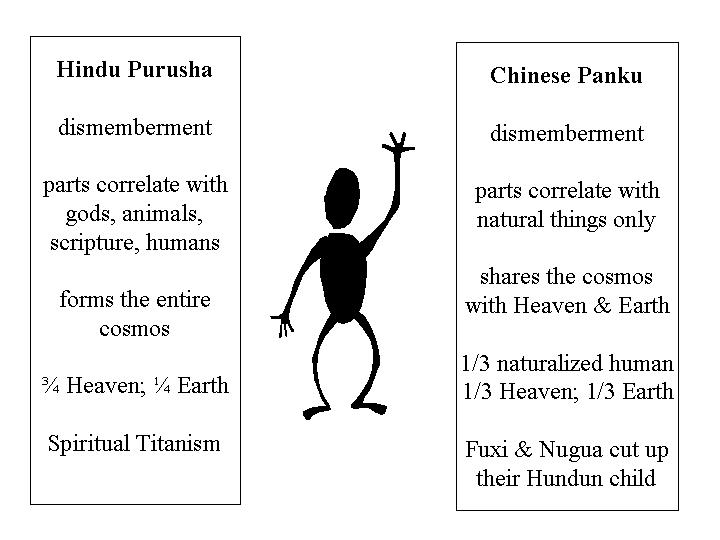

See Chap. 7 of the Zhuangzi for the Story of the Hundun
LAOZI vs. ZHUANGZI
preference for the yin and negative no preference, reference to
virtues the Mother disappears
Dao is nameless but
natural names no predicates describe the real
for the 10,000 things no names are reliable. Language
skepticism
liberation via the very ordinary liberation via the extraordinary
ci as motherly love, one of the ci mentioned four times,
three treasures but not in the Inner Chapters
the yin and the negative are valuable nothing has any value. Ethical
skepticism
nature mysticism "performance" mysticism of knackmasters
Dao is the unity of many real things "Deconstruction" of the real or some qualified
affirmation of the real?
ZHUANGZI'S THREE MEANINGS OF SHEN
1. The vital energy of the universe, also named by qi.
2. Shen as the psychophysical unity of the self, like the pre-Platonic pysche or Hebrew nephesh. Best translated as "self" or "soul" in the broadest and "somatic" sense of the word.
3. Shen as spirit-filled. A. C. Graham uses the Greek "daimonic" as in Socrates' daimon.
Zhuangzi's "perfect person" (zhi ren), "true person" (zhen ren), "spirit person" (shen ren), "great person" (da ren), complete person (cheng ren), "person of virtue" (de ren), and the sage (sheng).
Let us look at five translations of the phrase zhi ren shen:
Burton Watson: "The Perfect Man is godlike."
Wing-tsit Chan: "The perfect man is a spiritual being."
A. C. Graham: "The utmost man is daemonic."
Fung Yulan: "The perfect man is mysterious."
Kwang-ming Wu: "The ultimately arrived man is spirit-filled."
Naming and language make plurality, but this distorts the Dao. The one Dao is the only reality. "This" and "that" and the 10,000 things are not real, or we can’t know them to be real.
TYPES OF SKEPTICISM
SENSE SKEPTICISM: We cannot trust our senses in giving us information about the world. Both Plato and Descartes are sense skeptics but not epistemological skeptics.
ETHICAL SKEPTICISM: We cannot prove that there are any moral truths. Chinese story about the farmer and his son.
EPISTEMOLOGICAL SKEPTICISM: We cannot have any certain knowledge regardless of the sources: the senses, reason, intuition, etc.
LANGUAGE SKEPTICISM: We cannot use language, at least in propositional form, to express any truths.
SEXTUS EMPIRICUS: The best summary of the complete skeptical position in the West.
ASIAN SKEPTICS? The Buddha? Nagarjuna? Zhuangzi?
PREMODERNISM, MODERNISM, AND POSTMODERNISM
Do these thinkers anticipate postmodernism? Possibly constructive postmodernism?
PREMODERNISM - Holism, organicism, animism, teleology (everything has a purpose, de)
Time as an Eternal Now and a "the terror of history."
Sacralization of the world: confirmation to the seasons and cycles of life.
Fact, value, beauty all unified
Collective self or no self
MYSTICISM is premodern in its affirmation of a primordial totality, or actually an extreme response to ancient dualisms and a focus on the individual liberated yogi? (See Spiritual Titanism, p. 43). The absolute monism of some forms of mysticism is not a typical premodern view.
MODERNISM - atomistic and mechanistic vs. holism and organicism of premodern views. Rejection of Teleology-- machine as analogy rather than living organism. Time as linear-- affirmation of history.
Autonomous self: self-legislating and increasingly isolated. Self as a social atom. Sacred split off from the secular. Other splits and dichotomies: mind/body; self/world; self/others; private/public; religion/morality/science; theory/practice; ought/is; value/fact/beauty/inner/outer.
POSTMODERNISM. In general this view rejects dichotomies and substance metaphysics of modernism. Also rejects autonomous self.
DECONSTRUCTIVE POSTMODERNISM: Rejection (deconstruction) of all theories of reality - including theories of God, time, and self. Complete "fragmentation" of the self. No fixed interpretations of any text or event. "Language" skepticism. No word or concept is adequate to its object: No moral law.
CONSTRUCTIVE POSTMODERNISM: "Process" metaphysics rather than "substance" metaphysics. Social-relational self. Retrieval of value of premodern views of the sacred and community. Revision of modernist rights and duties. Reconstruction of ethics, perhaps as a revision of ancient virtue ethics.
Zhuangzi as a Deconstructive Postmodernist:
1. There is a deconstruction of the self.
2. He subverts all distinctions and value dichotomies.
3. Like the French philosopher J. Derrida: complete arbitrariness of all signifiers. A strong language skepticism: once a word is spoken it can enver have the same meaning in any future usage.
4. Both use indirect methods of avoid the paradox of language skepticism (to wit: your proposition that language has no fixed meaning must have a fixed meaning). Derrida's "writing under erasure" and the nameless Dao. Martin Heidegger drawing a big "X" through the German noun Sein=being, or reality.
Evidence against the Deconstruction Thesis:
"Great Understanding" is better than "Little Understanding." There is illumination (ming) of the Dao. Zhuangzi's total unity vs. Derrida's radical fragmentation. The Dao as the norm. Cook Ding is better than other butchers.
See Spiritual Titanism (chap. 11) for more on this subject.